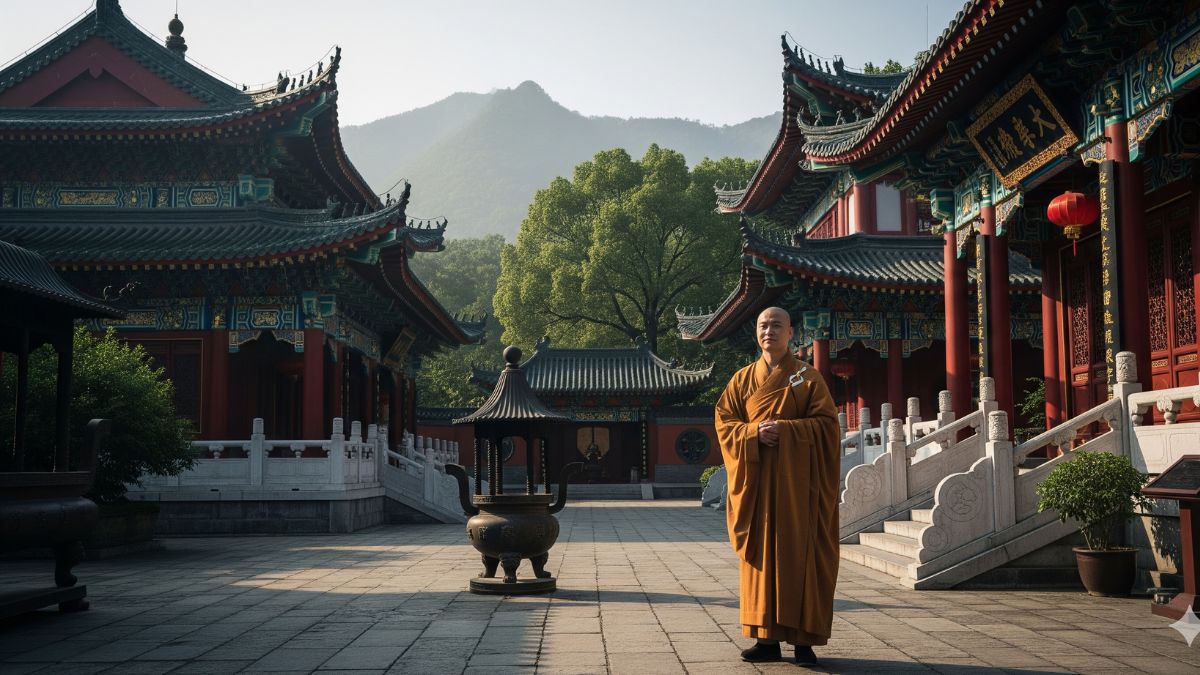<p><!–StartFragment –></p>
<p class=”pf0″><span class=”cf0″>The downfall of Shi Yongxin, the once-untouchable abbot of China’s Shaolin Temple, has thrown fresh light on the precarious status of the country’s most powerful religious leaders. Long hailed as the “CEO monk” for transforming the 1,500-year-old monastery into a global brand worth hundreds of millions of yuan, Shi had previously survived allegations of embezzlement and sexual misconduct in 2015.</span></p>
<p class=”pf0″><span class=”cf0″>But this summer, his luck ran out. In July, shortly after returning from a Vatican trip to meet Pope Francis, the Shaolin Temple announced that Shi was under investigation for misusing funds and fathering children with multiple mistresses. Within two weeks, he was dismissed, stripped of his monkhood, and vanished from public view, according to a report by The Guardian. </span></p>
<h2 class=”pf0″><span class=”cf0″>A wave of temple scandals</span></h2>
<p class=”pf0″><span class=”cf0″>Shi’s dramatic fall is the most prominent in a string of recent controversies shaking Chinese Buddhism. In July, police in Zhejiang accused Wu Bing, a popular monk known as Daolu, of fraudulently raising donations meant for vulnerable women and children, which were allegedly spent on personal luxuries. He, too, lost his monastic title.</span></p>
<p class=”pf0″><span class=”cf0″>Just weeks later, a video of monks at Hangzhou’s Lingyin Temple counting piles of cash around a table went viral, triggering outrage online. “Those who worship Buddha become poor, and monks become rich,” one user wrote, as the clip fuelled growing scepticism over the so-called “temple economy.”</span></p>
<h2 class=”pf0″><span class=”cf0″>Monks, money and mistrust</span></h2>
<p class=”pf0″><span class=”cf0″>Wealth has long been intertwined with Chinese Buddhism. In medieval times, monasteries acted as banks, loaning money at interest. Today, however, lavish spending by monks draws public anger and official scrutiny.</span></p>
<p class=”pf0″><span class=”cf0″>“Raising funds for religious purposes is one thing, but personal enrichment attracts both public disapproval and political risk,” Kin Cheung, associate professor of East and South Asian religions at Moravian University told The Guardian.</span></p>
<p class=”pf0″><span class=”cf0″>Under President Xi Jinping, Beijing has sought to rein in both excess wealth and religious influence. In 2017, the government revised regulations to ban profit-making practices at Buddhist and Taoist sites and warned against “damaging the pure and solemn image” of China’s ancient faiths.</span></p>
<h2 class=”pf0″><span class=”cf0″>The rise </span><span class=”cf1″>— and fall — of Shaolin Inc</span></h2>
<p class=”pf0″><span class=”cf1″>Shi Yongxin embodied the boom years of temple commercialisation. Having joined Shaolin in 1981 when it lay in ruins, he rebuilt it into a tourism juggernaut. Millions visited every year, buying tickets, merchandise and witnessing dazzling martial arts shows. The local government reaped huge revenues, while Shi gained political clout, serving two decades as a delegate to China’s National People’s Congress and meeting global leaders from Nelson Mandela to Queen Elizabeth II.</span></p>
<p class=”pf0″><span class=”cf1″>But critics argued he blurred the line between faith and commerce. His acceptance of a luxury sports car from local officials in 2006 symbolised his wealth. “Monks also need to eat,” he once quipped when questioned about his lifestyle.</span></p>
<p class=”pf0″><span class=”cf1″>Now, with economic growth slowing and discontent simmering, Beijing appears intent on curbing the extravagance he epitomised.</span></p>
<h2 class=”pf0″><span class=”cf1″>Return to austerity?</span></h2>
<p class=”pf0″><span class=”cf1″>Shi’s replacement, Abbot Shi Yinle, has vowed to strip Shaolin of its commercial excesses. Since August he has banned costly rituals, halted stage performances and pledged to remove shops inside the temple complex. “Shaolin should return to its true essence,” said one visitor, retired civil servant Xie Chuanggao.</span></p>
<p class=”pf0″><span class=”cf1″>Yet signs of reform remain mixed. Tourists still pay 80 yuan to enter the temple grounds, where yellow-robed monks stage daily martial arts shows and gift shops bustle with buyers of Shaolin souvenirs.</span></p>
<h2 class=”pf0″><span class=”cf1″>A mixed legacy</span></h2>
<p class=”pf0″><span class=”cf1″>For some, Shi Yongxin’s contributions cannot be dismissed. “Without him, Shaolin would not have achieved global fame,” said Tom Li, a 21-year-old medical student visiting from Henan University. “There are pros and cons, but you can’t deny his contribution. Honestly, if I were a monk, I’d also want to drive a Range Rover.”</span></p>
<p class=”pf0″><span class=”cf1″>Whether the crackdown signals the end of China’s temple economy or simply the fall of one high-profile figure remains to be seen. What is clear is that the balance between faith, wealth and politics in modern China is being recalibrated — and monks once deemed untouchable are no longer safe from scrutiny.</span></p>
<p><!–EndFragment –></p>
World
China’s ‘Temple Economy’ Under Scrutiny As Scandals Engulf Top Buddhist Monks
by aweeincm

Recent Post
ISIS Recruiter, Rapist, Criminals Seen Using Phones, Watching TV Inside Bengaluru Jail
Allegations of major security lapses and preferential treatment at Bengaluru’s ... Read more
“No Question Of Saving Anybody”: Devendra Fadnavis On Pune Land Deal Row
Maharashtra Chief Minister Devendra Fadnavis on Saturday said action in ... Read more
15-Year-Old Dragged Inside School Compound, Gang-Raped In Madhya Pradesh
A 15-year-old girl was gang-raped by two men and a ... Read more
Vet Deals Even If You Have To “Pay Fees”: Ajit Pawar’s Advice For Son Amid Land Row
Facing a volley of attacks from the Opposition over the ... Read more